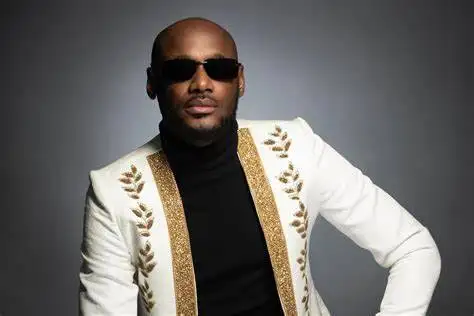Legendary Nigerian singer Innocent Ujah Idibia, popularly known as 2Face or 2Baba, has opened up about the impact of his timeless hit song African Queen, describing it as both a “blessing” and a “burden.”
The award-winning artist made the revelation during a recent episode of the Entertainment & Lifestyle show, where he reflected on his two-decade-long career and the song that changed everything for him.
2Face, who rose to continental fame after leaving the Plantashun Boiz group, said African Queen gave his career an unforgettable spark but also came with challenges that followed him for years.
Read Also: 2Baba pens emotional open letter as he marks 25 years in music
He said, “African Queen has been a very huge blessing, and e come turn to problem join for me. But I am grateful for everything.”
The singer explained that while the song opened doors to global opportunities, it also became a weight he had to carry throughout his career.
According to him, the success of African Queen set a high standard that many expected him to maintain, making it difficult to escape comparisons.
Released in 2004 as part of his debut solo album Face2Face, African Queen became a continental anthem that introduced Afro-pop to international audiences.
The love ballad, which celebrates the beauty and grace of African women, was featured in the 2006 Hollywood film Phat Girlz, further cementing its global reach.
The success of African Queen made 2Face one of Africa’s most celebrated musicians. It earned him international recognition, including awards from BET, MTV Europe, and MOBO, making him one of the first African artists to achieve such honours.
However, the hit song has also been a source of long-running controversy. 2Face’s former bandmate from Plantashun Boiz, Ahmedu Augustine Obiabo, popularly known as Blackface, has repeatedly accused him of stealing the song.
Blackface has maintained over the years that he originally wrote African Queen and that 2Face used it without proper credit. The feud between the two former friends has played out publicly through interviews, social media posts, and even court threats.
2Face, in several past interviews, admitted that African Queen was initially a collaborative effort during their Plantashun Boiz era, but firmly denied claims that he stole it.
He explained that he later reworked and recorded the song for his solo project after the group disbanded.
Despite the controversies, African Queen remains one of the most iconic songs ever produced in Nigeria’s music industry. Its melody, simplicity, and heartfelt lyrics continue to resonate with fans across generations.
The song’s legacy was further reaffirmed in August 2025, when Billboard named African Queen the “Greatest Afrobeats Song of All Time.”
The announcement reignited debates over its ownership, with fans revisiting the long-standing dispute between 2Face and Blackface.
Speaking on the renewed attention, 2Face acknowledged that African Queen had taken on a life of its own, beyond him, beyond the controversy, and beyond time. “It’s one of those songs that will always live on. It carries a piece of who I am,” he said.
The song’s emotional depth and romantic message have continued to influence new generations of artists, producers, and songwriters.
As 2Face reflected on his journey, he expressed gratitude for the blessings that came with the song, even though it sometimes felt like a double-edged sword.
“I can’t deny what it has done for me,” he said. “It brought me fame, love, and success, but it also came with pressure and misunderstanding. Still, I thank God for everything.”
More than twenty years later, African Queen remains a cultural treasure, a song that not only launched 2Face’s solo career but also shaped the sound and soul of modern African music.



